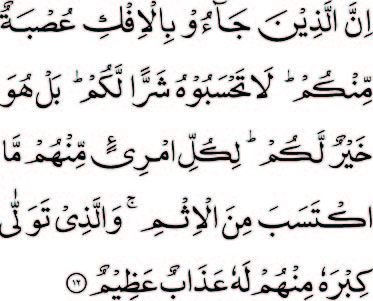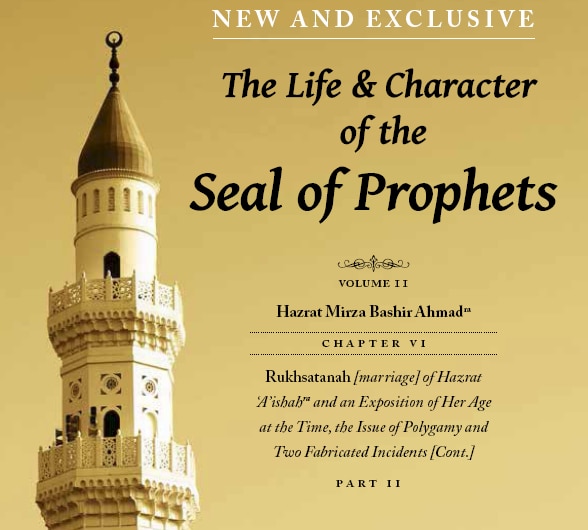
© Shutterstock
Reem Shraiky, UK
Islam has paid significant attention to the family unit because it is the primary building block of society. It has laid the foundations for choosing who to marry, and given each spouse rights and duties, and clarified their roles.
The Holy Qur’an and the Holy Prophet (sa) mention that the basis of marital life must be affection, love, togetherness and mercy.
Moreover, Islam clarifies that if one of the spouses falls short in a matter, the other party must overlook it and turn a blind eye to it. Spouses must look at the positive attributes of each other instead of focusing on the negatives only; the Holy Prophet (sa) said:
‘A believing man should not hate a believing woman (i.e. his wife); if he dislikes one of her characteristics, he will be pleased with another’. (Muslim).
Of course, this also applies to a wife towards her husband, but most of the ahadith focus on the need for the husband to treat his wife kindly. This is because Islam came at a time when women were mostly without rights; indeed, Islam brought about a revolution that established countless rights for women. This revolution was in fact the basis for women obtaining their rights in the whole world throughout the ages.
However, the Messenger of Allah (sa) was not neglectful of mentioning things that women should refrain from in their marital life as well. Islam has commanded spouses that each one of them should rightly choose his or her partner, and base this choice on righteousness and piety. The Holy Prophet (sa) stated:
“When someone with whose religion and character you are satisfied asks your daughter in marriage, accede to his request. If you do not do so there will be temptation in the earth and extensive corruption.” (Tirmidhi).
There is no doubt that choosing spouses on the basis of piety would benefit society as a whole, as such marriages would produce good children who would grow up in a righteous and loving family living under Islamic moral principles and values.
Such a marriage where spouses keep the fear of Allah in mind in every word they say and every action they take, will create love and affection in their hearts towards each other and lead to the tranquillity and the psychological comfort which is one of the goals of marriage in Islam, as Allah the Almighty states:
“And one of His Signs is that He has created wives for you from among yourselves that you may find peace of mind in them, and He has put love and tenderness between you”. (30:22)
Islamic history is in fact full of stories of pious souls who chose their partners based on their righteousness, whether they were poor, unsightly, uneducated or from a lower class. One of these stories is that of Julaybib (ra).
Julaybib, a companion of the Holy Prophet (sa) was not a handsome man. He was deformed, and extremely short. Moreover, he was an orphan and poor with unknown lineage. Therefore, he was a lonely soul yearning for the love and compassion that was alien to him.
But he became a devoted servant of Allah and a beloved Companion of the Holy Prophet (sa). Julaybib earned the love of the Holy Prophet which was the greatest honour he could have dreamt of.
The Holy Prophet Muhammad (sa) cared for him and was sensitive to his needs, which is why he once told him: ‘I am going to arrange a marriage for you’. Julaybib replied ‘But I am an outcast!’. The Holy Prophet said: ‘In the eyes of Allah you are not an outcast’. (History of Baghdad).
In a narration reported by Imam Ahmad, Prophet Muhammad (sa) went to a man of the Ansar and said, “Give me your daughter for marriage.” The man answered excitedly, “Yes, O Messenger of Allah, it would be an honour and a blessing.” Thereupon, the Holy Prophet (sa) said, “I do not want her for myself.” The Ansari man asked, “Then for whom, O Messenger of Allah?” The Holy Prophet (sa) answered, “For Julaybib.” Having heard this, the man was shocked and then said, “O Messenger of Allah, let me consult her mother.”
He went to his wife and told her, “The Messenger of Allah is proposing marriage for your daughter.” In response, she joyfully said, “Yes, it would be a pleasure.” The Ansari explained to his wife that the Holy Prophet was not proposing to marry their daughter himself, but on behalf of Julaybib. His wife was quite shaken and immediately responded, “What! Julaybib? No, by Allah, we will not marry her to him.”
When the Ansari was about to leave to meet the Messenger of Allah to inform him about his wife’s disapproval, his daughter, a pious Muslim girl, asked her father, “Who is asking for my hand?” Her mother told her that the Prophet was asking her hand on behalf of Julaybib. Their daughter instantly asked them, “Are you refusing to follow the command of the Messenger of Allah? Follow his command, for I will not come to any harm.”
When the Holy Prophetsa came to know about her response, he prayed for her:
‘Oh Allah, bestow good on her in abundance and make not her life one of trouble and distress’ (Ibn Habban).
The following narration of the same story is mentioned in a book called ‘The Companions of the Prophet’:
‘Hearing her daughter’s word, the mother remorsefully said, “Stop, my daughter! Don’t say another word, for indeed I have erred, and I repent a thousand times over. As of this moment, there is no one who I would prefer for you other than Julaybib.” The following day the wedding reception was arranged’.
Thus, the Holy Prophet (sa) married the beautiful daughter of the Ansari to Julaybib who was once a social outcast; he gave him in fact the happiness he deserved.
The attitude of this Muslim young girl was that of a true believer, it shows the confidence of a Muslim woman who could not be influenced by the whims of her society.
Moreover, the fact that her parents did not interfere in her decision demonstrates how Islam does not pressure a woman nor does it disregard her right to choose her husband.
The couple lived happily together until Julaybib was martyred; when the battle was over, the Holy Prophet (sa) asked his companions: “Have you lost anyone?” They said: so and so, he asked the same questions again, they said: so and so, the Holy Prophet asked again ‘have you lost any one?’’, they said: ‘no’. Whereupon the Holy Prophet said, “But I have lost Julaybib. Search for him in the battlefield.”
The Companions searched for him and found him by the side of seven dead bodies of the enemy whom he had killed before someone of the enemy managed to kill him The Holy Prophet (sa) went there and stood by his side and said: ‘He is of me and I am of him.” He then placed him upon his arm till his grave was dug.(Muslim).
It is recorded that there was no widow among the Ansaar who spent more charitably than his widow; this was the fulfilment of the prayer of the Holy Prophet when he prayed to Allah to shower her with His blessings and goodness.
As you know, upon marriage, one of the rights of the wife is the Mahr (dowry), Allah the Almighty states:
‘And give the women their dowries willingly. But if they, of their own pleasure, remit to you a part thereof, then enjoy it as something pleasant and wholesome’ (4:5)
Huzur Aqdas (aba) said:
“The Promised Messiah (as) admonishes us not to follow the un-Islamic customs that people have added to their faith because of the influence of the society in which they live. These customs have been adopted from other religions. For example, there are some frivolous customs during celebrations of marriage—like showing off the dowry given to the bride by her groom’s family, or the gifts brought by them, or publicly displaying the dowry given to the bride by her own family. This is quite a show. Islam only enjoins Haq Mahr [bride’s due right] to be publicly announced as a part of the religious marriage ceremony. All other customs are frivolous.” (Conditions of Baiaat)
Thus, exaggeration and excessiveness in demanding large Mahr is prohibited.
The Holy Prophet (sa) said: “The best of marriage is that which is made easiest.” (Ibn Hibbaan)
He also stated: “The best of mahr is the simplest (or most affordable).” (al-Bayhaqi ).
Even an iron ring can be Mahr as the Holy Prophet (sa) said to a man who wanted to get married: “Look for something to give as a Mahr, even if it is a ring of iron.” (Abu Dawood).
Islam has suffused the marriage contract with the strongest guarantees to ensure the happiness of the spouses and bring goodness to their families. It gives each spouse rights and duties towards each other, and demands that they treat each other well and help each other in their shared life. It also outlines the right ways to resolve any disputes that might arise between them.
Among the things that Islam has required of a woman is obedience to her husband, when the husbands are at home, they are obedient to them and guard their secrets; and when they are away, they not only guard their secrets but take care of their property and guard their own chastity. A woman should not reveal her husband’s secrets, even to her mother, sister or best friend.
Allah the Almighty stated:
‘Virtuous women are those who are obedient, and guard the secrets of their husbands with Allah’s protection.’’ (4:35)
Abu Huraira (ra) narrated that when Allah’s Messenger was asked which woman was best? he replied, “The one who pleases [her husband] when he looks at her, obeys him when he gives a command, and does not go against his wishes regarding her person or property by doing anything of which he disapproves.” (Nasa’i).
The Promised Messiah (as) stated:
‘One of the bad habits of women is that they disobey their husbands in the simplest matters and spend their money without their permission, and if they are dissatisfied with them, they use obscene words against them. Such women are cursed by Allah and His Messenger. Neither prayer nor fasting nor any other work is accepted from them. God Almighty clearly says that a woman cannot be considered righteous unless she completely obeys her husband, and honours him with the love of the heart, and is sincere to him in his absence.
The Messenger of Allah (sa) said: Women must obey their husbands, otherwise no deed will be accepted from them. He also said that if it were permissible to prostrate to anyone other than God, I would order the wife to prostrate to her husband.
If a woman uses obscene language against her husband or despises him and is not deterred after learning about this divine command, then she is cursed. God Almighty and His Messenger are angry with her.
Women should not steal their husbands’ money and avoid all prohibitions. It must be remembered that the hijab is obligatory in front of all men except the husband and those with whom it is not permissible to marry. Women who do not observe hijab from non-mahrams are accompanied by Satan.
It is also obligatory for women not to allow immoral and bad-behaved women to enter their homes, nor to allow them to serve them, because it is a great sin for a righteous woman to be in the company of an immoral woman. (Tablighul Risala, “Collection of Announcements”, vol. 1, pp. 68-69, 1918 edition)
The Holy Prophet (sa) stated:
“If a woman does her five (daily prayers), fasts the month (of Ramadan), guards her chastity and obeys her husband, it will be said to her: Enter whichever of the gates of Paradise you want.” (Musnad Ahmad).
The Holy Prophet (sa) also said: “I was shown hell and I saw that there was an abundance of such women who were ungrateful.” It was asked, “Are they ungrateful to Allah?” He replied, “They are ungrateful to their husbands and are ungrateful for the favours and the good done to them. If you have always been good to one of them and then she sees something in you (not of her liking), she will say, “I have never received any good from you.”
Explaining this hadith, His Holiness (aba) stated:
‘It means that the majority of women, who were in hell due to their misdeeds, were such who were ungrateful to their husbands. Hence, firstly, this hadith does not mean that there will be more women than men in hell. Secondly, the reason why those women will be in hell has been mentioned. They are such women who repeatedly deny the favours of God Almighty, which He bestowed upon them through their husbands.
In contrast to this, tidings of paradise under the feet of pious and righteous women have been given in ahadith, which has not been given about any man. Moreover, Islam has granted men and women certain rights or designated certain duties to them according to their temperaments. It has obliged the man to work and fulfil all the needs of the household and has instructed the woman to safeguard the house and the children and look after their upbringing.
In other words, man was chosen to toil outside in accordance with his capabilities while the woman was given the leadership over the house in accordance with her nature and in view of her dignity. There is no room for any doubt in the saying of the Holy Prophet (sa) that women are in a way weaker in terms of faith and mental strength because this saying is in exact accordance with the nature of women.
Likewise, Islam has assigned more obligations to the husband. Thus, in terms of rights and responsibilities of men and women, the Islamic system is in exact accordance with nature and there are no holes in it’. (Answers to everyday issues – Part II, alhakam.org).
Some women are unfortunately seeking divorce or khula for small problems which can easily be solved with wisdom and love, such a decision is sometimes taken due to the interference of a family member or incitement of a friend. Remember that only when there are real causes of differences and that disputes exceed all limits, the arbiters should preferably be chosen from the relations of the contending parties in order to bring about reconciliation between them and to try to save the marriage and solve the problems.
We have also to remember that the Holy Prophet (sa) warned women from seeking divorce without a very valid reason, he stated:
‘Any woman who asks her husband for a divorce when it is not absolutely necessary, the fragrance of Paradise will be forbidden to her.’ (Sunan Ibn Majah).
The Promised Messiah (as) said, advising his community:
‘Always pray for your spouses and avoid divorce, because the one who hastens to divorce is bad and very hated in the eyes of Allah – Glory be to Him -. Do not quickly break, like a filthy and unclean vessel, what Allah has joined together.’ (Tuhfa Golravea, Rohani Khazain, Vol. 17. P.75).
It is of human nature to sometimes get angry or say hurtful words unintentionally. If any rift of this kind occurs between the spouses, an apology must be made and the other party must forgive and forget the matter as if it had never happened. The spouses must not sleep unless they are reconciled and happy:
It was narrated from Anas (ra) that the Prophet (sa) said:
“Shall I not tell you about your men in Paradise?” We said: Yes, O Messenger of Allah. He said: “The Prophet will be in Paradise, the Siddiq will be in Paradise, the man who visits his brother who lives far away and visits him only for the sake of Allah will be in Paradise. Shall I not tell you about your women in Paradise?” We said: Yes, O Messenger of Allah. He said: “The loving and fertile one who, if she gets angry or is mistreated or her husband gets angry says, ‘Here is my hand in your hand, I shall not sleep until you are pleased.’” (al-Mu’jam al-Awsat by Tabarani).
Husayn ibn Muhsin (ra) said that his paternal aunt went to the Messenger of Allah (peace and blessings of Allah be upon him) concerning some need and he met her need, then he said: “Do you have a husband?” She said: Yes. He said: “How are you with him?” She said: I do what he tells me, except what is beyond me. He said: “Look at how you are with him, for he is your Paradise and your Hell.” (Musnad Ahmad).
This means your husband is the cause of your entrance to Paradise if he is pleased with you, and the cause of your entrance to Hell if he is displeased with you.
Asmaa’ bint Zaid (ra) came to the Holy Prophet (sa) when he was sitting with a group of his male companions. She said: “May my mother and father be sacrificed for you O Messenger of Allah (sa), I am the ambassador of Muslim women to you, know, may my soul be sacrificed for you, that there is no woman, whether in the East or the West, who has heard or not heard of my coming to you, but she is of the same opinion as me. Allah has sent you to both men and women. We believe in you and your Lord.
Yet we, women, have to stay at home. We are the object of men’s desire and we bear their children. Nevertheless, men have privileges, such as the obligatory Friday prayer, attending funerals and going on jihad campaigns. When they leave for jihad, we look after their property and we rear their children. O Messenger of Allah (sa), do we have a share of reward for doing so?” The Prophet (peace and blessings of Allah be upon him) turned to the men attending him and said: “Have you ever heard a more eloquent woman putting forward a case concerning her faith?” They said: “We never thought that a woman could be so expressive”. The Prophet (peace and blessings of Allah be upon him) said to her: “Go and tell all women that when any of you is a goodly wife, giving her husband a pleasant life and cutting out friction, she earns a reward equal to all that you have mentioned of men’s reward”. She went away glorifying Allah and praising Him. (Shuábul Iman by Baihaqi).
Thus, selfishness, indulging in materialism and neglecting household affairs are not the characteristics of true believing women.
A believing woman, even if she is a worker and earns money, must realize that her home is her first kingdom and her first responsibility, and that caring for her husband, raising children, and taking care of them is her priority, because of which she will enter Paradise and have a happy marital life and will raise righteous children.
The aim of marriage for a religious person should be a means of avoiding evil deeds and purging one’s soul of sins. It should be a means of acquiring nearness to the Almighty Allah, and that the couple help each other to grow in spirituality, tolerance and forgiveness for the sake of attaining Allah’s pleasure:
A person went to the Holy Prophet (sa) and said: “I have a wife who always welcomes me when I come home and escorts me to the door when I leave. When she finds me sad and unhappy, she then consoles me by saying: ‘If you are thinking of sustenance, then do not despair, because Allah provides sustenance; and if you are thinking about the next life, then may Allah increase your intellect and efforts.’” Then the Holy Prophet stated: “Allah surely has agents in this world, and your wife is one of those. Such a woman would be rewarded half as much as a martyr.” (Makarimul Akhlaq by Tabrasi).
If a woman fulfils her responsibilities towards her husband, her home, and her children, her husband will accommodate her even when she is angry and will not inflame the problem further:
A man came to the house of Sayyidna Umar (ra) to complain about his wife. On reaching the door, he heard ‘Umar’s wife shouting at him and reviling him, while he kept silent.
Seeing this, the man was about to go back, thinking that if Umar himself is in the same position of mine how I can seek his help?”. ‘Umar (ra) saw the man turning back, so he called him and enquired about the reason for his visit. He said that he had come with a complaint against his wife, but turned back on hearing that the Khalifa was in the same position. ‘Sayyidna Umar (ra) replied that he tolerated the excesses of his wife for she had certain rights against him. Then he added: “She prepares food for me, bakes my bread, washes my clothes and suckles my children. Besides, I enjoy peace of mind because of her and am kept away from indecent acts on account of her. I therefore tolerate all her excesses. The man said: My wife is doing the same things. Sayyidna Umar replied: You should also adopt the same attitude as their anger will remain for a short period of time only” (Al-Kabaér by Al-Dhahabi and Al-Zawagir by Ibn Hajar).
We are most blessed to have these resplendent pearls of wisdom in our literature to guide us regarding the responsibilities of both husbands and wives.
By striving to become more pious, grateful, and obedient wives this will have far-reaching positive effects, not only within our homes, but in our Jama’at and wider society.
Like Julaybib’s wife, it is vital we do not get taken away by society’s whims which are in conflict with Islamic practices, instead we should be proud of our Muslim identity and be grateful that Allah has given us opportunities to reap huge blessings without even needing to step outside our homes. Let us recognise the Divine wisdom behind the honourable duties designated to men and women in Islam, which are in perfect harmony with our natural dispositions. By discharging these responsibilities, we can God willing attract the blessings of Allah Almighty and make our homes a Paradise upon earth.
May Allah Ta’ala enable us to do so to the very best of our abilities and grant us goodness in this world and the next. Ameen.
About the Author: Reem Shraiky is a life devotee of the Ahmadiyya Muslim Community – International Arabic English Translation & Research Office, UK.




Add Comment